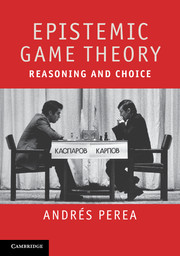Book contents
- Frontmatter
- Contents
- List of figures
- List of tables
- Acknowledgments
- 1 Introduction
- Part I Standard beliefs in static games
- Part II Lexicographic beliefs in static games
- 5 Primary belief in the opponent's rationality
- 6 Respecting the opponent's preferences
- 7 Assuming the opponent's rationality
- Part III Conditional beliefs in dynamic games
- Bibliography
- Index
5 - Primary belief in the opponent's rationality
Published online by Cambridge University Press: 05 July 2012
- Frontmatter
- Contents
- List of figures
- List of tables
- Acknowledgments
- 1 Introduction
- Part I Standard beliefs in static games
- Part II Lexicographic beliefs in static games
- 5 Primary belief in the opponent's rationality
- 6 Respecting the opponent's preferences
- 7 Assuming the opponent's rationality
- Part III Conditional beliefs in dynamic games
- Bibliography
- Index
Summary
In this chapter, and also the following two, we will restrict our attention exclusively to games with two players. The reason is that we want to keep our formal analysis as simple as possible, while still being able to convey the main ideas. In fact, all ideas, definitions and results in this chapter and the following two can be extended to games with more than two players.
Cautious reasoning about the opponent
In the chapters we have seen so far, your belief about the opponent's choice has always been modeled by a single probability distribution over the opponent's choices. In particular, you may assign probability zero to an opponent's choice a, which would reflect a state of mind in which you completely rule out the possibility that your opponent will choose a.
However, in many situations it may be wise to adapt a more cautious way of reasoning about your opponent, in which you could deem some of the opponent's choices much more likely than some of the other choices, but where you never completely rule out any opponent's choice from consideration. As an illustration, let us consider the following example.
Example 5.1 Should I call or not?
This evening, your friend Barbara will go to the cinema. She has told you that you can call her if you want to go, but that she will decide on the movie. In the village there is a small cinema with two screens that shows classic movies, and this evening there is the choice between The Godfather and Casablanca.
- Type
- Chapter
- Information
- Epistemic Game TheoryReasoning and Choice, pp. 187 - 249Publisher: Cambridge University PressPrint publication year: 2012



